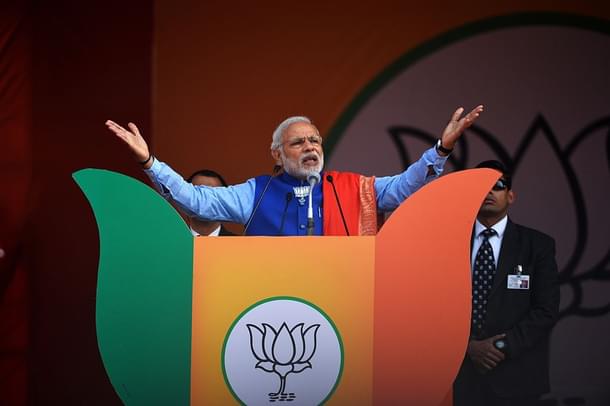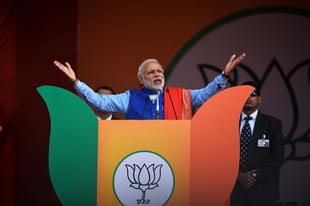Blogs
In The Political Muddle Post-Surgical Strikes, The Game Is Now PM Modi’s And BJP’s To Lose
Sudip Kar Purkayastha
Oct 15, 2016, 01:53 PM | Updated 01:53 PM IST
Save & read from anywhere!
Bookmark stories for easy access on any device or the Swarajya app.


A storm is raging in India. It’s about who should get credit for the ‘surgical strike’ in Pakistan-occupied Kashmir (PoK), which, in a perfectly co-ordinated action of a few hours, exterminated seven or eight terrorist launch pads, and with it, terrorists and some Pakistani army men. In the ensuing din and dust, one fact has been lost to most Indians. After nearly seven decades of Indo-Pak conflict, all through which the ‘peace doves’ had been attempting to influence successive governments and the people on their suggestion that ‘talks with Pakistan’ was the only way forward, the political class has at last admitted that ‘strength’ is also an option.
They only differed on the question of who should get the ‘credit’ for it.
But has a realisation really dawned on the Indian establishment that not all problems can be resolved through ‘peace talks’? Has India learnt from history the core lesson that there are always extreme cases where application of force is the only solution unless one decides to commit harakiri? What would have happened if European nations did not gather the courage to fight it out with Hitler in the late 1930s and early 1940s?
Next, does the Modi government deserve credit for the surgical strike? The impeccable manner in which it was carried out sent shock waves through Pakistan. At the same time, it is an accepted fact that the Indian armed forces have always been a distinguished fighting force. How come, then, did it not perform such a feat in the last three decades?
According to many analysts, for last three decades, successive governments had kept the country’s armed forces under a tight hold even while the proxies from Pakistan kept attacking it secretly at a time and place of their choosing. The Indian armed forces could do nothing except reacting to it, and even then, with considerable restraint. As a result, the ratio of casualties on their side was higher, causing them intolerable pain and anguish. This ‘strike’ came after the armed forces were released from the hurting and humiliating ‘fetter’ and given a free hand to deal with the enemy unlike any other government, including the Vajpayee government. The success of the confidence placed in the ‘force’ was for everyone to see.
Isn’t this reason enough to give Modi and his government some credit for the surgical strike? Not to forget, Modi took a grave political risk by this action. He would have suffered serious dent in his image had this strike backfired. Besides, this strike is not an ‘end’ in itself but only the beginning of a long-drawn strategy. Unless he is able to carry it out in its entirety (while simultaneously managing the support of the global community for India), he would remain exposed to serious political risks.
Political parties seem to be oblivious of this big picture. They are obsessed with the immediate impact of the ‘surgical strike’ on the upcoming elections in Uttar Pradesh (UP) and Punjab. Their assessment that the vast majority of Indians have emotionally welcomed the ‘strike’ has both raised the ruling party’s temptations to use this as leverage and aggravated the opposition parties’ anxiety. All hell broke loose after some wing of the Bharatiya Janata Party (BJP) in UP displayed banners associating the party with the ‘surgical strike’. Top leaders of both the BJP and the opposition parties have been fighting against each other over this matter.
Intriguingly, some opposition leaders picked up pieces of their arguments from Pakistan’s statement claiming that no such surgical attack was carried out and that India was making false claims. Pakistan’s intent behind the denial probably was that India should proactively prove itself as an ‘invader’ country before the global community, which would be accomplished if the latter submitted video or other proof suo moto. Besides, such enthusiastic disclosure could give Pakistan some clues about the Indian military strategy, which could come to their aid in the future.
Delhi Chief Minister Arvind Kejriwal lauded the army and Modi’s will power for the surgical strike, adding that Pakistan’s denial of the surgical strike to international media was damaging India’s credibility. To counter this, he urged Modi to unmask and snub Pakistan, implying that India ought to release proof. The average Indian, however, failed to understand his logic: Why should India come before the world with proof and give scope for all and sundry to muddle the waters when Pakistan itself has denied having suffered the strike? Is it not an opportunity to quietly repeat such attacks till all terror camps in PoK are exterminated?
The responses from various Congress leaders have been confrontational and strange at the same time. There were flip flops by expressing doubt over the surgical strike and then declaring full faith in the Director General of Military Operations. They also laid a counterclaim that during the United Progressive Alliance regime, the army had conducted several ‘surgical raids’. But the party brought itself discredit when on TV channels, former ‘generals’ revealed that those strikes were in no way comparable to this one. The fact that the previous strikes were, at best, at the battalion level, when the recent surgical strike necessitated the involvement of two ‘corps commanders’, lays bare the difference.
This made the Congress party rush to its core concern of ‘vote’. Rahul Gandhi charged Prime Minister Modi for benefitting from the blood of the soldiers: “Jo humare jawan hain, … Jammu Kashmir mein jinhone apna khoon diya hai, jinhone Hindustan ke liye surgical strike kiya, unke khoon ke piche aap chupe huye ho.’
He laid a more damning charge: ‘unki aap dalali kar rahe ho.’
Expectedly, this evoked strong criticism from scores of BJP leaders, including party president Amit Shah. Last to join the fray was Samajwadi Party leader Akhilesh Yadav, who lent his shoulder unexpectedly to his political rival Rahul Gandhi, saying that if Rahul Gandhi accused Prime Minister Modi of khoon ki dalali, there must be a reason for it. In a nutshell, one can see mayhem in the political space today around the surgical strike.
Looking at the surgical strike debate objectively, it seems impossible for the opposition to exclude BJP from electoral benefits, given the emotional connect of the masses to this issue. This action has come after decades of India having been brow beaten, bloodied and cheated by Pakistan and having swallowed hurt and humiliation in the name of peace talks and the bluff of nuclear weapons. This was a response that people saw as having come ‘at long last’ and as a sign of a new course of action from a brave, confident India. It has seemingly set the cat amongst pigeons in a cage. How much ever the birds flutter or rebuke, they cannot negate its impact, unless of course the Modi government itself does a U-turn and scores a self goal. The BJP will also harm itself if it tries to hype the matter. It is a natural beneficiary of the action. But overuse will harm its electoral prospect.
Interestingly, amid this running feud, Modi’s stature as a statesman has been growing steadily. In Kozhikode on 23 September 2016, he had warned that the perpetrators of Uri would not be spared. Through the surgical strike in the intervening night of 28-29 September, it was avenged. But he exhibited exemplary restraint. Referring to the exuberance displayed by some BJP leaders, he cautioned against chest-thumping. More recently, he delivered a poignant message to his countrymen saying that this Vijaya Dashami was a special one and it was an occasion for national celebration. Prime Minister Modi attributed the success to the armed forces, saying a strong armed force was a necessity to be a strong nation.
This strong, firm version of Modi has been unknown to Pakistan. It is also probably puzzled to not find friendly nations on its side to fight back. It is, therefore, likely that its leaders would now go for a temporary truce and re-ignite the pro-Pakistani lobby in India, i.e., politicians and intellectuals, to pressure the Modi government into peace talks. In a recent interview to the media, Mushahid Hussain Syed (Sharif’s special envoy on Kashmir) pointed to such a possibility. He praised Modi saying he had the capacity to spring surprises. Adding that Pakistan Prime Minister Sharif and Indian Prime Minister Modi enjoyed good personal rapport, he expressed hope that the latter would again embrace Sharif in ensuing SAARC summit takes place and realise that it is the way forward. Pakistan ambassador Abdul Basit has also started broaching the same topic.
Pakistan may again use the subterfuge of ‘peace talks’ to derail India’s offensives against terrorism. Prime Minister Modi must recognise that if there is any let off now, India may not be able to recreate this configuration of domestic and international situation in another 25 years. This is the chance to resolve terror problems in Kashmir, and the country expects him to take this surgical strike to its logical conclusion.
Sudip Kar Purkayastha is an author. His latest book ‘On the Road to Freedom: Footprints on Indian History’ is a two volume work. A former banker and consultant Purkayastha was also the founding editor of ‘Indian Journal of Bank Marketing’. He had written articles in several national dailies & journals.




